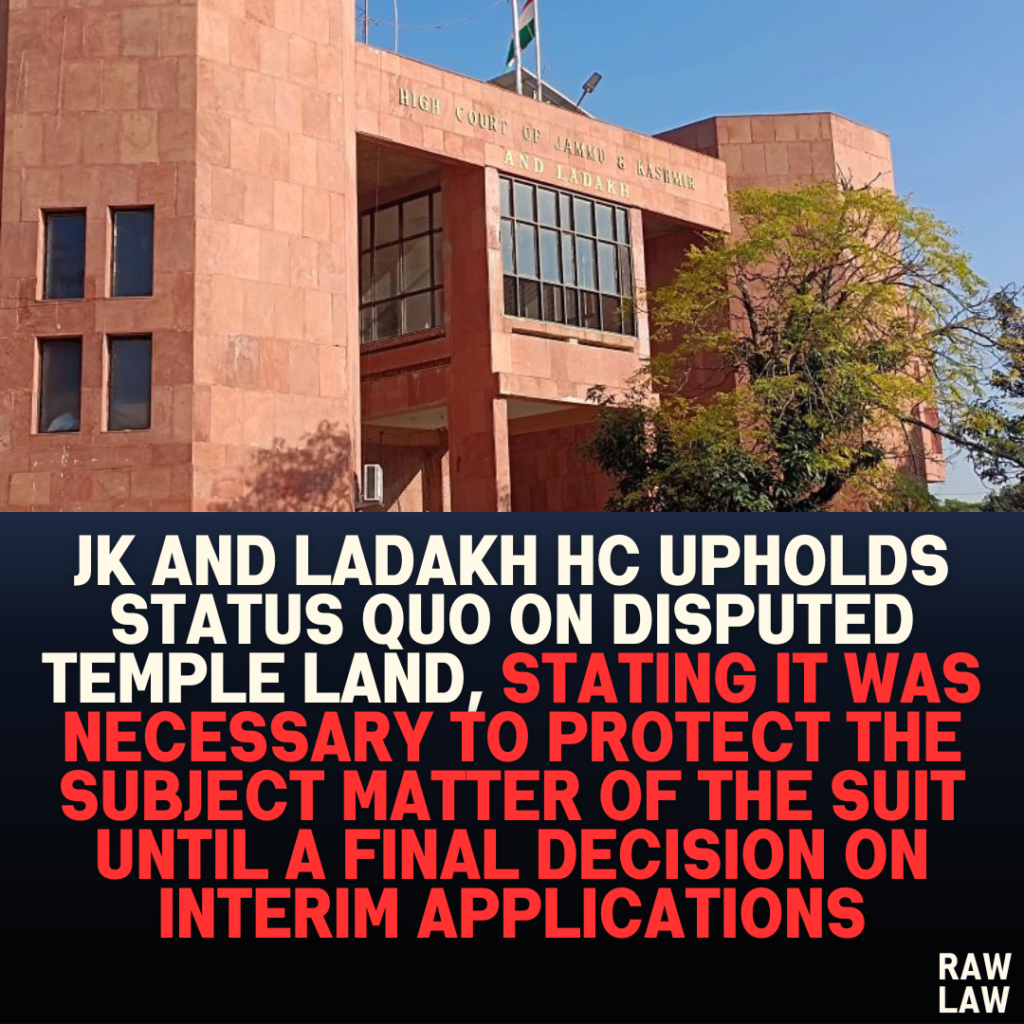Court’s Decision:
The High Court dismissed the writ petition and appeal, reaffirming the trial court’s interim order to maintain status quo on the disputed land where a temple exists. The court emphasized that it cannot interfere with the trial court’s discretion, which was exercised to protect the subject matter of the dispute. The trial court was directed to expedite the hearing of the interim application filed by the plaintiffs for a temporary injunction.
Facts:
The case revolves around land situated at Gupt Ganga, Nishat, Srinagar, where a temple is located. The petitioners (owners of the land as declared by decrees dated 28.02.1997) contended that the temple was constructed by security forces, whereas the respondent, a Trust, claimed that the land was donated to them and the temple was constructed by their founder. Several suits and petitions have been filed by both parties, leading to multiple court orders regarding the land and temple.
The trial court had earlier dismissed suits filed by the Trust for non-prosecution, but they were restored. The petitioners filed a separate suit for a permanent injunction, which was stayed by the trial court. This was followed by interim orders from the High Court, instructing the trial court to maintain status quo and consolidate the suits filed by both parties.
Issues:
Whether the trial court was right in passing an ex-parte interim order allowing devotees to continue offering prayers at the temple located on the disputed land.
Whether the High Court should interfere with the trial court’s discretion regarding the interim order.
Petitioner’s Arguments:
The petitioners argued that no temple existed on the land when they acquired it and that the temple was constructed by the security forces who had been occupying the property. They contended that the trial court should not have passed an ex-parte order when similar applications filed by the Trust were still pending.
Respondent’s Arguments:
The respondent Trust claimed that the land had been donated to them, and a temple was constructed by their founder. They emphasized that devotees had been offering prayers at the temple since the security forces vacated the land. The Trust argued for maintaining the status quo until the final resolution of the suits, highlighting the rights of devotees to continue performing religious rituals.
Analysis of the Law:
The case involved the application of Order 39, Rules 1 & 2 of the Civil Procedure Code, which pertains to the granting of temporary injunctions. The High Court assessed whether the trial court’s ex-parte order was legally sound and whether it constituted an overreach, given that the applications for similar relief were pending.
Precedent Analysis:
No specific precedents were mentioned in the judgment; however, the court referred to principles governing the exercise of discretion by trial courts in granting interim orders and the limited scope of interference by higher courts in such matters unless the discretion is exercised perversely or erroneously.
Court’s Reasoning:
The High Court found that the trial court’s discretion to extend the interim arrangement was neither illegal nor perverse. The court observed that a temple existed on the disputed land and that the status quo was necessary to protect the subject matter of the suit until a final decision on the interim applications could be made. The court held that it could not interfere with the trial court’s decision since it did not find any gross irregularity or error.
Conclusion:
The writ petition and appeal were dismissed. The trial court was instructed to expedite the hearing of the interim applications filed by the Trust for temporary injunction. The High Court upheld the trial court’s decision to maintain status quo, allowing devotees to continue offering prayers at the temple.
Implications:
The decision highlights the limited scope of appellate courts in interfering with the discretionary powers of trial courts, particularly in matters involving temporary injunctions. The judgment also underscores the importance of preserving the status quo in property disputes until a final adjudication can be made, especially in cases involving religious sentiments and public rights.




Pingback: Uttarakhand High Court Quashes Recovery Order Against Retired Employee; Directs Re-fixation of Pay Scale and Payment of Arrears in Line with Prior Judgments - Raw Law
Pingback: "Delhi High Court Rules on Ancestral Property Dispute: Rejects Claims of Oral Partition, Orders Property Division and Accounting of Rental Income—‘Merely Constructing on Portions of a Property Does Not Establish Partition Without Concrete Evidenc
Pingback: Patna HC Grants Four Weeks to Convert Writ Petition into Civil Miscellaneous Petition; Clarifies that Judicial Orders of Civil Courts Cannot Be Challenged Under Article 226 But Must Be Filed Under Article 227 - Raw Law